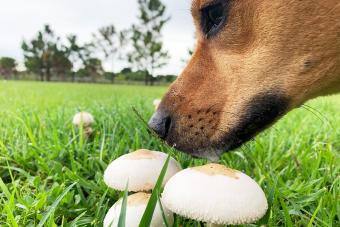
Yes, dogs can eat mushrooms, but proper precautions must be taken. In moderation, many mushrooms are safe to feed to dogs. Although not every dog will appreciate mushrooms, some may find them to be a tasty treat. Continue reading to learn more about the health advantages of mushrooms and how to incorporate them into your dog's diet safely.

Mushrooms Have Beneficial Properties
Button mushrooms, cremini mushrooms, oyster mushrooms, and portobello mushrooms are examples of edible mushrooms. Holistic veterinarians utilize other mushrooms not only for feeding but also for treatment. Medicinal mushrooms come in a variety of forms, including maitake (hen of the woods) and shiitake mushrooms.

Mushrooms are abundant in fiber and protein in some varieties. Mushrooms also have a lot of antioxidants, some of which aren't damaged by cooking, and can aid in the elimination of free radicals in the body. Mushrooms are also packed full of:
- Amino acids
- Vitamin A
- B vitamins
- Copper
- Enzymes
- Folate
- Iron
- Magnesium
- Manganese
- Niacin
- Pantothenic acid
- Potassium
In addition to these nutrients, mushrooms also contain riboflavin, phosphorus, selenium, thiamin, and zinc.
If Your Dog Eats a Wild Mushroom
Not all mushrooms are healthy to eat (neither for humans nor dogs). In the wild, there are several deadly mushroom species. As a result, you should never let your dog consume a mushroom that has grown in your yard, in the woods, or in a field.

Depending on what type of mushroom your dog consumed, they can experience a variety of symptoms, including:
- Vomiting
- Lethargy
- Diarrhea
- Disorientation
- Neurological issues
- Jaundice
As with any suspected poisoning case, your vet will need to know what your dog ate, how much they ate, and when they ate it. Although your dog may show indications of poisoning within 15 minutes, symptoms may take up to 12 hours to appear. If your dog eats a wild mushroom of an unknown species, contact your veterinarian right away (if possible, take photos of the mushroom and bring in samples) to see if it's harmful.
How Many Mushrooms Should Dogs Have?
Mushrooms should be introduced to your pet's diet gradually, just like any new food, to avoid stomach upset. Over several days, gradually increase the amount of mushrooms you give your dog.

Feed mushrooms in moderation, just like any other treat you give your dog. Too many mushrooms (or any other food, for that matter) can throw your dog's nutrition off balance. There isn't any particular amount for mushrooms in general. Each individual mushroom species is recommended in a different amount. Some mushroom species should only be offered in minute amounts, whereas others can be offered in higher amounts. To determine the amount of the particular mushroom you are considering, speak to your veterinarian.
Medicinal mushrooms can be purchased dried, powdered, or as capsules. If you want to offer your dog medicinal mushrooms to address a specific ailment, see your family veterinarian or a holistic veterinarian to ensure you're administering the correct mushroom at the right dose.
How to Prepare Mushrooms for Dogs
Raw mushrooms are difficult for dogs to digest, and they can also make your dog sick, producing vomiting or diarrhea. Therefore, mushrooms should be cooked prior to serving.
Before you cook mushrooms for your dog, make sure they're properly rinsed to remove any pesticides or debris. If any visible dirt remains, a fast rinse with cold water followed by a clean wipe with a dry paper towel is the best way to clean mushrooms.
Cook the mushrooms in a pan with a small amount of dog-safe cooking oil, such as olive oil. There's no need to season with salt or other spices, but for added taste, add some low-sodium chicken broth or low-sodium beef broth to the pan of mushrooms near the end of cooking. Simply keep sautéing until the mushrooms absorb the broth.
Allow the mushrooms to cool and feed them on their own or add them to your dog's usual food.
Keep Your Dog from Wild Mushrooms
To keep your dog from eating potentially harmful wild mushrooms, make sure you check outside on a frequent basis to make sure no fungi are growing that they can get their paws on. Ensure you only provide edible mushrooms that are safe for your dog to consume. Although there are many varieties of safe and beneficial mushrooms, they are also mushroom species that can be harmful. If you have any questions regarding a particular type, or you're looking to feed your dog mushrooms for medicinal reasons, contact your veterinarian.







